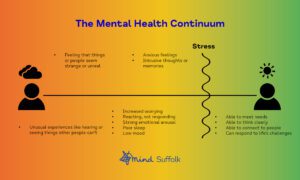What is The Mental Health Continuum?
The Mental Health Continuum is a way of thinking about mental health used by Suffolk Mind to inform our service provision and the way we support people.
It sees mental health as flexible – that there are reasons why people experience mental ill-health – and gives hope that recovery is not only possible, but likely.
Here, Fiona Hanlon, Senior Trainer at Suffolk Mind, explains what the Mental Health Continuum is, and how it gives us the chance to make realistic changes in our lives to improve our mental health.
A different way of thinking about mental health
The Mental Health continuum is a simple and powerful way of thinking about mental wellbeing.
It breaks from some of the ways we spoke about mental health in the past – that you either have a diagnosis or you don’t. While we might sometimes think about mental health in terms of conditions like depression, anxiety and more serious conditions, most professionals agree that our mental health is on a continuum.
A continuum is a fancy word for a scale, running from a state of wellbeing, where we are meeting our physical and emotional needs well enough, to severe and enduring mental ill-health at the other end – where we are unable to meet those needs.
The tipping point
The crossover point on the Mental Health Continuum is stress.
If we are not able to meet our emotional or physical needs, we are more likely to experience stress.
Stress is perfectly natural and designed to keep us safe in the short term.
It gets our fight or flight response going so we are ready to physically respond to whatever the stressor is.
Another important thing to understand is that stress is nature’s way of telling us that a key emotional need is not being met in our lives.
But if we experience stress for a longer period, it may cause us to become unwell and move along the mental health continuum, away from wellbeing.
This may lead to things like anxiety, feeling on constant high alert, our natural resource of imagination is on overdrive, and potentially envisaging worse case scenarios for everything.
If we are in stress for an extended period, we may also experience mild to moderate depression with poor sleep and low mood as two common symptoms.
Realistic hope
All of us have mental health, just as we have physical health.
We are all on the Mental Health Continuum – and we move up and down it depending on how we cope with the challenges of life and the stresses that it creates.
In the same way it is possible to move away from wellbeing and experience mental ill-health, it is also possible to make changes to meet our Emotional Needs and move back towards wellbeing.
That sounds overly simple. It can be hard work in reality, but it is a really important message for people to hear, a message of hope.
Sometimes when people get a diagnosis of a mental health condition it can feel like a prophecy. It can feel like things are never going to get better and this is who you are.
However, when we look at mental health as a continuum, we see there will always be a story behind how somebody moved along the continuum – and it will be a story about unmet needs and stress.
If we can understand that story and support someone to make changes in their life in healthy ways, they can slowly move along the continuum back towards wellbeing.
The important message is that change is possible – what we want to offer people is realistic hope.
What next?
Courses
Suffolk Mind have a number of free courses available for you to book on via our Free Wellbeing Sessions page. You can also access The Mental Health Toolkit: The Essentials for free when you sign up to become a Friend of Suffolk Mind. This session introduces you to mental health and the Emotional Needs & Resources approach.
Counselling
Counselling can benefit anyone. Counselling provides you with the opportunity to talk about issues and any challenging emotions you have in a private, secure setting. Self-refer for a counselling service today.
Further reading
Visit our Resources hub, which is full of blogs on a range of mental health topics.
Contact us
Email or telephone our team via the Contact us page.












